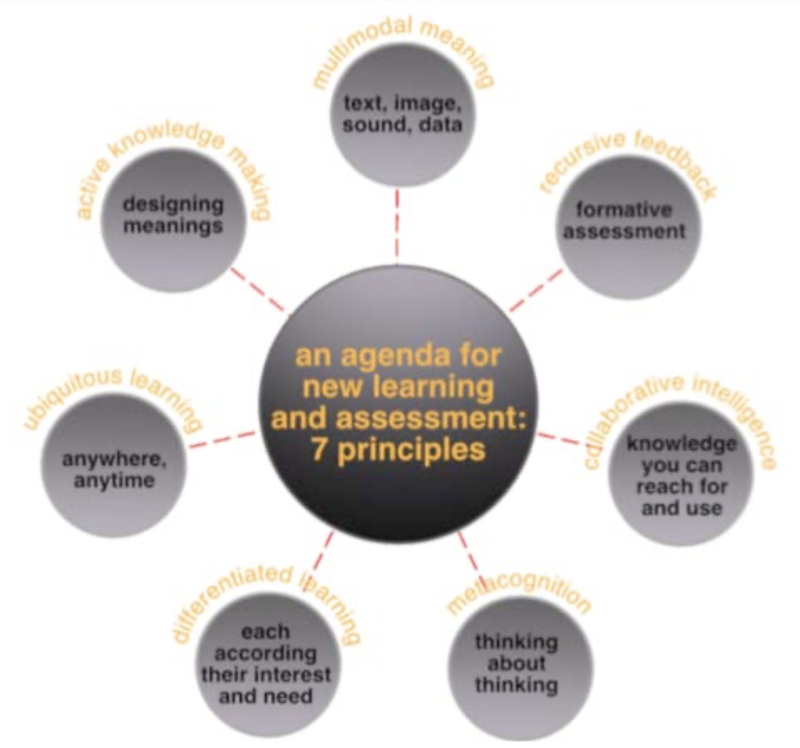New Learning MOOC’s Updates
Update: Coursera is a transformative pedagogy learning platform
In my optional update #5, I actually addressed the question “Describe and analyze an educational innovation. In what senses might it be called "transformative"?” and used the Coursera[1] example.
I will rebound on the optional update to review the Coursera platform using the 7 e-Learning affordances of new learning and assessment.
- Spatio-Temporal: unlike didactic pedagogy usually confined between the 4 walls of the classroom and the cells of a timetable, Coursera adapts to a reflexive ubiquitous learning pattern that particularly corresponds to authentic pedagogy in tune with the learners’ context and rhythms.
- Epistemic: Coursera relies a lot on videos & text which are watched & read rather passively as in didactic pedagogy. There is authentic pedagogy in that the learner has freedom to browse the links and wonder in further, self-found internet links (Wikipedia[2], YouTube[3], Google [4], etc.). On one hand, there is limited active knowledge-making exercises, but on the other hand, students are obliged to construct their own representation of the knowledge for the reason that the understanding support provided is actually limited and that students must fill in their understanding gaps by building it alone. This eventually leads to transformative pedagogy.
- Discursive: Coursera’s lectures and quizzes mostly stick to didactic pedagogy traditional tools, but Coursera courses also incorporate many multimodal links that range from illustrations to impactful Ted Talks. In this sense, it is authentic pedagogy in that learners can emphasize media that work best for them.
- Evaluative: depending on the messaging activity on the Forums, evaluation is either summative with quiz tests or more formative, based on the recursive feedback from Forum dialogs and peer reviews and comments for the updates/essays. I am now finishing my fourth Coursera course and, beyond recommendations for additional courses, I do not see any substantial synergies in analytics and feedback. This evaluative dimension is therefore mostly on the didactic side.
- Social: social diversity among learners is high because learners come from all around the world! But, although I once experienced substantial collaborative attitude (exchanging thoughts via the forums) on a philosophy course on edX (it was in a fixed timeframe with essays graded by faculty staff), I have not noted a high level of social exchanges on Coursera. However, Coursera learning is directly linked to the Internet and one is not alone in this respect. Coursera is therefore partly transformative.
- Cognitive: in effect, taken one by one, the Coursera courses do not go much beyond facts to remember and especially theories to apply, and this is didactic pedagogy. But the context of experiencing Coursera goes beyond in metacognition. Indeed, as the learner is quite alone, yet makes a personal commitment to the course, the learner is forced to reflect further to make sense of the course: how do the learnings relate and apply to the learner’s own situation and interests. Additionally, the tremendous diversity of Coursera’s courses allows to connect dots between the courses, creating analogies between subjects and perspectives. For example, I find the connections between the courses Machine Learning[5] of Andrew Ng (Stanford Professor and Coursera founder) and Learning, Knowledge, and Human Development[6] of Mary Kalantzis and William Cope strikingly strong: one topic allows to understand the other much better. Building such analogies is transformative pedagogy type of metacognition.
- Comparative: each Coursera course is more from the one size fits all perspective, but the global lifelong learning curriculum opportunity Coursera offers is fully individual specific and differentiated, corresponding to both authentic and transformative pedagogy.
To conclude, I consider Coursera to be powerful reflexive pedagogy learning platform with courses that feature a mix of didactic, authentic and transformative pedagogies.
[2] https://www.wikipedia.org/
[5] https://www.coursera.org/learn/machine-learning
[6] https://www.coursera.org/learn/learning-knowledge-human-development?


